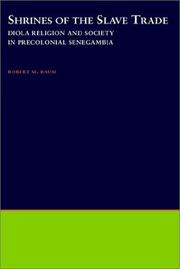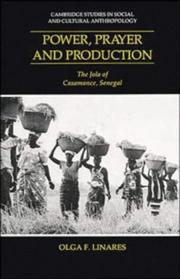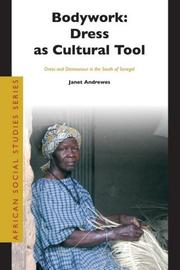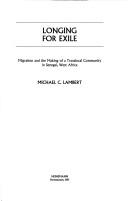| Listing 1 - 7 of 7 |
Sort by
|

ISBN: 1280761725 0195352475 9780195352474 0195123921 9780195123920 9786610761722 6610761728 0197741185 Year: 2023 Publisher: New York ; Oxford University,
Abstract | Keywords | Export | Availability | Bookmark
 Loading...
Loading...Choose an application
- Reference Manager
- EndNote
- RefWorks (Direct export to RefWorks)
This text aims to reconstruct religious and social history of Diola communities in southern Senegal during the precolonial era, when Atlantic slave trade was at its height. It shows how leaders used religion to regulate the influence of the trade, and demonstrates how this changed religious life.
Diola (African people) --- Slave trade --- Dyamate (African people) --- Dyola (Senegalese and Gambian people) --- Jola (African people) --- Kudamata (African people) --- Kujamatak (African people) --- Yola (Senegalese and Gambian people) --- Ethnology --- Religion. --- History. --- Esulalu (Senegal)
Book
ISBN: 3515043551 Year: 1985 Volume: vol 78 Publisher: Wiesbaden Stuttgart Steiner
Abstract | Keywords | Export | Availability | Bookmark
 Loading...
Loading...Choose an application
- Reference Manager
- EndNote
- RefWorks (Direct export to RefWorks)
Diola (African people) --- History. --- Dyamate (African people) --- Dyola (Senegalese and Gambian people) --- Jola (African people) --- Kudamata (African people) --- Kujamatak (African people) --- Yola (Senegalese and Gambian people) --- Ethnology --- History --- Casamance (Senegal) --- Casamance, Senegal --- Région de Casamance (Senegal) --- Kolda (Senegal : Region) --- Ziguinchor (Senegal : Region) --- Casamance. Histoire. --- Casamance. Geschiedenis.

ISBN: 0195123921 Year: 1999 Publisher: New York Oxford university press
Abstract | Keywords | Export | Availability | Bookmark
 Loading...
Loading...Choose an application
- Reference Manager
- EndNote
- RefWorks (Direct export to RefWorks)
Diola (African people) --- Slave trade --- Diola (Peuple d'Afrique) --- Esclaves --- Religion --- History --- Commerce --- Histoire --- Esulalu (Senegal) --- Esulalu (Sénégal) --- Slave-trade --- Dyamate (African people) --- Dyola (Senegalese and Gambian people) --- Jola (African people) --- Kudamata (African people) --- Kujamatak (African people) --- Yola (Senegalese and Gambian people) --- Ethnology --- Religion. --- History.

ISBN: 0521401321 0521040353 0511557647 051187863X Year: 1992 Volume: 82 Publisher: Cambridge : Cambridge University Press,
Abstract | Keywords | Export | Availability | Bookmark
 Loading...
Loading...Choose an application
- Reference Manager
- EndNote
- RefWorks (Direct export to RefWorks)
The Jola (Diola) are intensive wet-rice cultivators in the Lower Casamance region of Senegal. In this study, the author examines the reasons behind startling contrasts in the organization of agricultural tasks among three Jola communities located within a 45-kilometre radius from Ziguinchor. In Sambujat, situated in the non-Islamisized region south of the river, wet rice is a monocrop cultivated by both men and women. In Jipalom, in the Kajamutay region north of the river, Islam and cash cropping have been adopted; and in Fatiya, in the so-called 'Mandingized' region of the Kalunay, social relations have become hierarchical and this has had profound effects on the cropping system and on the division of labour. The author examines the shift of power relations over time, and their effects on the way in which production has been organized by age and gender, kin and class. Larger issues dealt with are Islamization, women's labour and the introduction of cash cropping. A concluding section places the history of Jola labour relations within the context of the political economy of Senegal.
Diola (African people) --- Rice --- Diola (Peuple d'Afrique) --- Agriculture. --- Economic conditions. --- Politics and government. --- Conditions économiques --- Casamance (Senegal) --- Casamance (Sénégal) --- Social conditions. --- Religious life and customs. --- Conditions sociales --- Conditions économiques --- Casamance (Sénégal) --- Arts and Humanities --- Philosophy --- Dyamate (African people) --- Dyola (Senegalese and Gambian people) --- Jola (African people) --- Kudamata (African people) --- Kujamatak (African people) --- Yola (Senegalese and Gambian people) --- Ethnology --- Lowland paddy --- Lowland rice --- Oryza sativa --- Paddy (Plant) --- Padi --- Palay --- Oryza --- Casamance, Senegal --- Région de Casamance (Senegal) --- Kolda (Senegal : Region) --- Ziguinchor (Senegal : Region)

ISBN: 9004141073 9781429429122 1429429127 9789004141070 9781433704246 1433704242 9786610867202 6610867208 9047406400 9789047406402 1280867205 Year: 2004 Publisher: Leiden; Boston : BRILL,
Abstract | Keywords | Export | Availability | Bookmark
 Loading...
Loading...Choose an application
- Reference Manager
- EndNote
- RefWorks (Direct export to RefWorks)
This book looks at the encounter between dress and the body. In the social sciences, dress tends to be viewed as a form of communication, a way in which the wearer gives expression to his or her ideas or situation. 'Bodywork', rather than looking at what people do with their clothes, looks at what clothes do with the wearers. In the context of three small West African communities - Muslim, Christian and Animist - the book describes the dress styles and dress practices of the villagers and shows how a particular way of dressing influences the body's demeanour and habit. It considers thereby the role played by dress in the enculturation of the body.
Clothing and dress --- Diola (African people) --- Human body --- Body, Human --- Human beings --- Body image --- Human anatomy --- Human physiology --- Mind and body --- Dyamate (African people) --- Dyola (Senegalese and Gambian people) --- Jola (African people) --- Kudamata (African people) --- Kujamatak (African people) --- Yola (Senegalese and Gambian people) --- Ethnology --- Apparel --- Clothes --- Clothing --- Clothing and dress, Primitive --- Dress --- Dressing (Clothing) --- Garments --- Beauty, Personal --- Manners and customs --- Fashion --- Undressing --- Religious aspects&delete& --- Christianity --- Symbolic aspects --- Social life and customs --- Social aspects --- Casamance River Valley (Senegal) --- Casamance Valley (Senegal) --- Social life and customs. --- Sociology of culture --- Senegal --- Religious aspects --- Christianity.

ISBN: 0325070857 Year: 2002 Publisher: Portsmouth Heinemann
Abstract | Keywords | Export | Availability | Bookmark
 Loading...
Loading...Choose an application
- Reference Manager
- EndNote
- RefWorks (Direct export to RefWorks)
Rural-urban migration --- Diola (African people) --- Exode rural --- Diola (Peuple d'Afrique) --- Case studies. --- Social conditions. --- Economic conditions. --- Cas, Etudes de --- Conditions sociales --- Conditions économiques --- Dakar (Senegal) --- Dakar (Sénégal) --- #SBIB:314H250 --- #SBIB:39A6 --- #SBIB:39A73 --- Cities and towns, Movement to --- Country-city migration --- Migration, Rural-urban --- Rural exodus --- Migration, Internal --- Rural-urban relations --- Urbanization --- Dyamate (African people) --- Dyola (Senegalese and Gambian people) --- Jola (African people) --- Kudamata (African people) --- Kujamatak (African people) --- Yola (Senegalese and Gambian people) --- Ethnology --- Economic conditions --- Social conditions --- Migratie: algemeen --- Etniciteit / Migratiebeleid en -problemen --- Etnografie: Afrika --- داكار (Senegal) --- Горад Дакар (Senegal) --- Horad Dakar (Senegal) --- Дакар (Senegal) --- Ντακάρ (Senegal) --- Dakaro (Senegal) --- Dacár (Senegal) --- Ville de Dakar (Senegal) --- דקר (Senegal) --- Dakara (Senegal) --- Dakaras (Senegal) --- ダカール (Senegal) --- Dakāru (Senegal) --- Dakaa (Senegal) --- Ndakaaru (Senegal) --- דאקאר (Senegal) --- 達喀爾 (Senegal) --- Dakaer (Senegal)
Book
ISBN: 1282601962 9786612601965 9047428676 9789047428671 9781282601963 9789004175228 9004175229 6612601965 Year: 2009 Publisher: Leiden ; Boston : Brill,
Abstract | Keywords | Export | Availability | Bookmark
 Loading...
Loading...Choose an application
- Reference Manager
- EndNote
- RefWorks (Direct export to RefWorks)
Faith and Freedom in Galatia and Senegal reads Galatians 2:11-15 and 3:26-29 through the lens of the 19th-20th century experiences of French colonialism by the Diola people in Senegal, West Africa, and portrays the Apostle Paul as a ''sociopostcolonial hermeneut who acted on his self-understanding as God’s messenger to create, through faith in the cross of Christ, free communities' -- a self-definition that is critical of ancient Graeco-Roman and modern colonial lore that justify colonization as a divine mandate.' Aliou C. Niang ingeniously compares the colonial objectification of his own people by French colonists to the Graeco-Roman colonial objectifications of the ancient Celts/Gauls/Galatians, and Paul's role in bringing about a different portrayal.
Exegese.
---
Kolonialismus.
---
Religionssoziologie.
---
Religiöse Identität.
---
Diola (African people)
---
Theology
---
Dyamate (African people)
---
Dyola (Senegalese and Gambian people)
---
Jola (African people)
---
Kudamata (African people)
---
Kujamatak (African people)
---
Yola (Senegalese and Gambian people)
---
Ethnology
---
Christian theology
---
Theology, Christian
---
Christianity
---
Religion
---
Religion.
---
Paulus
| Listing 1 - 7 of 7 |
Sort by
|

 Search
Search Feedback
Feedback About
About Help
Help News
News